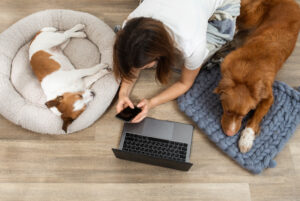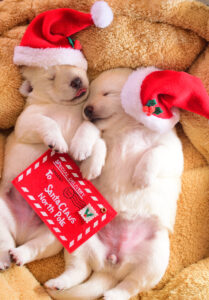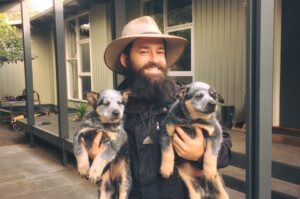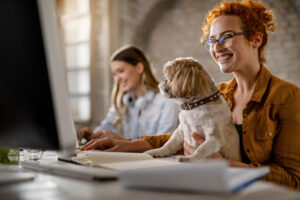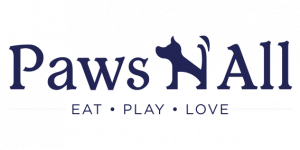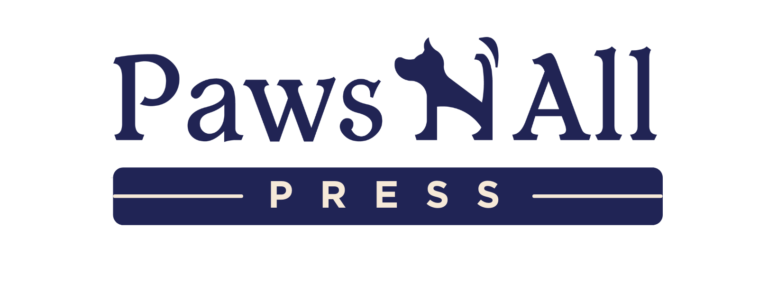Last year, for example, an 8 year-old Labrador in the UK required two operations after chomping down on a batch of gingerbread tree decorations – complete with attached ribbons.
In fact, there are many things we use to celebrate the festive season that can result in a trip to the emergency vet.Here is a breakdown of the most common Christmas dangers for dogs and some tips on how to avoid them.
Christmas decorations
- The most obvious Christmas dangers for dogs are festive decorations.
- Glass baubles are a troubling one. Dogs can confuse them for a real ball and give them a chomp. But they tend to be made of very fine glasses which shatters easily. The end result can be cuts both in the mouth and even internally through the digestive tract.
- Tinsel is another cause for concern. The metal string can damage your dog’s teeth and gums. If swallowed, tinsel can obstruct the bowel, requiring emergency surgery to remove.
- Be careful of battery-operated toys and decorations too. If your dog destroys them, the batteries and some components can be a choking hazard. Plus, they risk obstructing your dog’s bowel if swallowed.
- Wooden decorations and particularly pine cones can generate splinters if chewed.
- Live holly and mistletoe are poisonous if eaten – both to pets and to humans! If you like to decorate your home with these festive plants, be sure to keep them out of your dog’s reach and securely fastened them to the door frames etc.
- Be careful of candles too. They are a major fire risk if your dog knocks them over amid their excitement. Plus your dog could suffer burns if they get too close and their fur catches alight.
- Lights are another hazard. The glass bulbs can be sharp when broken or chewed, while lengths of Christmas lights can be a strangulation hazard. And of course if they are plugged in, electrocution is a major risk – and shiny flashy things are awfully tempting to chewy dogs!
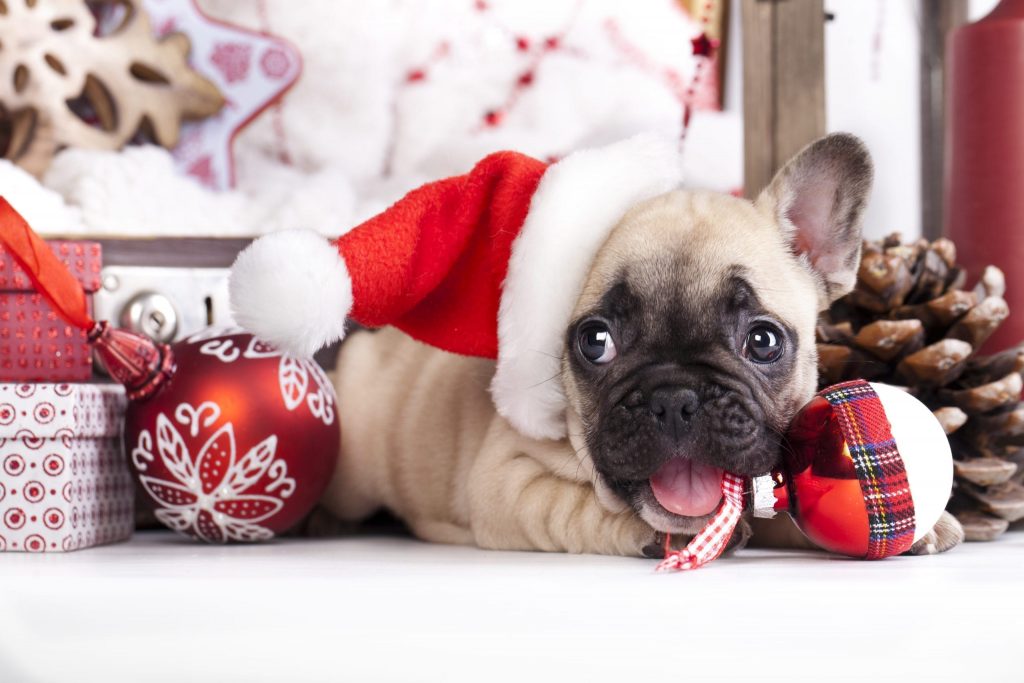
How to avoid these Christmas decorations dangers for dogs:
- Keep your dog outside while you are setting up and packing up your decorations.
- Set up your Christmas tree in a room your dog can’t enter.
- Only allow your dog indoors when supervised.
- Avoid using candles where dogs are present. Alternatively, opt for decorations where the tealight candle is contained within.
- Keep decorations out of reach of your dog – such as up high, inside display cabinets etc.
- Be selective in the types of decorations you put up. Unsuitable ones can be given to loved ones who don’t have a pet or donated to a local charity.
Christmas foods
Baubles, lights, tinsel, battery-operated toys and even the Christmas tree itself can all be dangerous to dogs if they are chewed on or swallowed.
Then there is Christmas lunch and its foodie traditions. Numerous things you eat are toxic to pets, and many of them are common at Christmastime.
These include chocolate and candy canes. The sultanas, raisins and currants in the Christmas pudding and cake too.
While you may want every member of the family to have a piece of the turkey, cooked bones are bad for dogs.
Fresh grapes are also a no-no for dogs. As are sugar-free sweets and soft drinks (which typically contain xylitol) and alcohol.
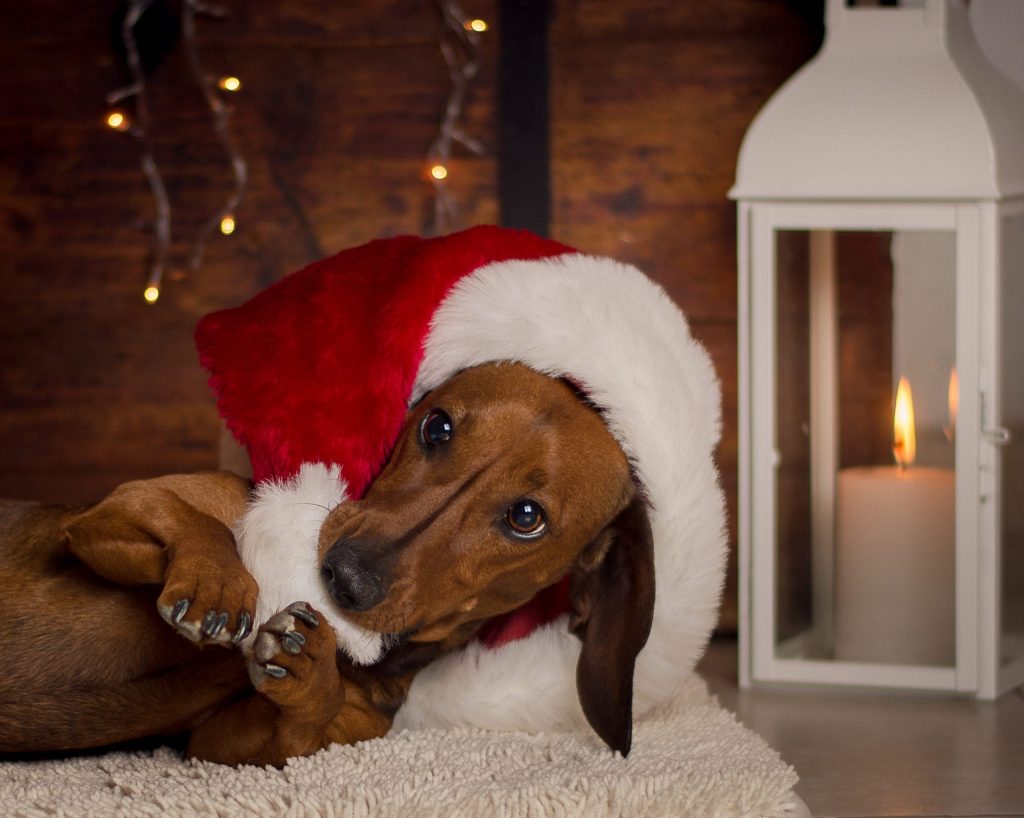
How to avoid these Christmas food dangers for dogs:
- Don’t feed your dog from the table. This reinforces their belief that they can share your food.
- Never leave food or ingredients unattended where your dog can reach.
- Give your pup healthy dog treats or a meal to enjoy while you sit down to eat.
- Spoil them with lean raw bones (such as kangaroo) or dehydrated turkey treats instead of cooked bones.
Christmas presents
While it’s always lovely seeing presents under the Christmas tree, they can be a temptation for your dog to sneak a peek (and taste!) before the big day.
Some wrapping papers use bleach and chemicals that can be toxic if eaten. Meanwhile ribbons and bows can cause bowel obstructions.
Also be mindful of what you’ve actually wrapped. Food items, regardless of whether they are intended for your dog or a person, will tempt your dog with their scent. As too can candles, perfumes and other aromatic gifts.
When it comes to dog Christmas presents, the same applies as any other time of year: make sure they are actually suitable for dogs.
Buttons and zippers can easily be detached and get lodged in your dog’s bowel or cause your dog to choke. Plastics can splinter when chewed and cause injuries. Similarly, wood will splinter when chewed, which can cause injuries and infection.
Remember that children’s toys are often designed for snuggling with, and will not withstand chewing and rough play by dogs.
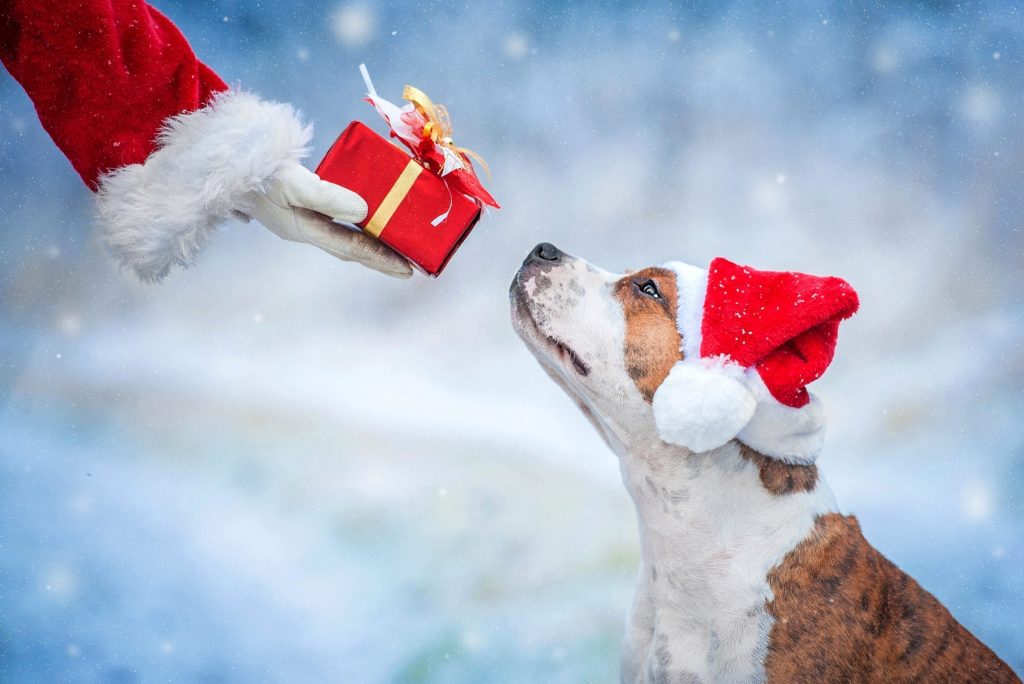
How to avoid these Christmas presents dangers for dogs:
- Use non-toxic gift wraps
- Gift wrap your presents with natural fibre ribbons (they’re better for the environment anyway!)
- Avoid giving gifts that smell like food
- If you do have such gifts, keep them securely in a cupboard out of reach instead of under the tree.
- Only give you dog toys that are specifically designed for pets.
- Make toys appropriate for your dog’s size and age.
Other Christmas dangers for dogs
There are other things that happen over the Christmas/New Year period to be aware of:
- Fireworks frighten many dogs. Indeed, runaway dogs is a common problem at this time of year. Keep them indoors with you if possible, ensure gates and doors are securely closed and distract them with a treat or toy.
- Hot surfaces. Sneaking hot food off the stove or barbecue can cause burns to your dog’s tongue, mouth and stomach. (This applies all year-round, but family gatherings around the holidays can make it easier to overlook).
- Christmas time in Australia means it’s summer and snakes are about. Keep your lawn mowed, supervise your dog as much as possible and have your emergency vet’s number on hand just in case!
- As always, if you have any concerns about your dog’s wellbeing – including what they eat – consult your local vet.
As always, if you have any concerns about your dog’s wellbeing – including what they eat – consult your local vet.
Sources:
American Kennel Club
https://www.akc.org/expert-advice/health/are-rawhide-chews-dangerous-for-dog/
Fox Valley Animal Hospital
https://foxvalleyanimalhospital.com.au/vet-hospitals-xmas-guide/
RSPCA NSW
https://www.rspcansw.org.au/what-we-do/care-for-animals/pet-hazards/christmas-season/
VetWest Animal Hospitals
https://www.vetwest.com.au/news/8-tips-for-keeping-your-pet-safe-at-christmas-time



